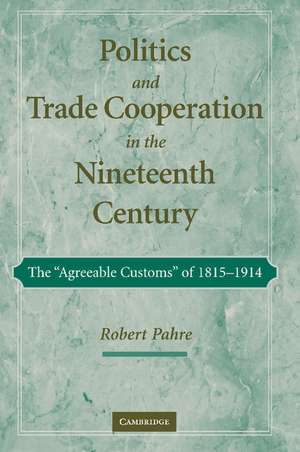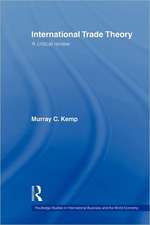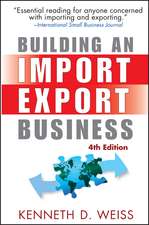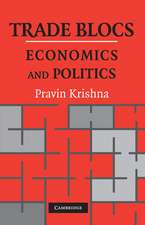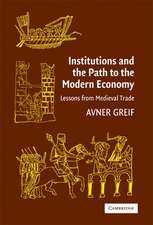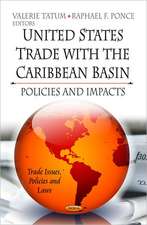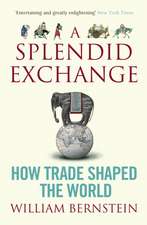Politics and Trade Cooperation in the Nineteenth Century: The 'Agreeable Customs' of 1815–1914
Autor Robert Pahreen Limba Engleză Paperback – 3 oct 2012
| Toate formatele și edițiile | Preț | Express |
|---|---|---|
| Paperback (1) | 290.04 lei 6-8 săpt. | |
| Cambridge University Press – 3 oct 2012 | 290.04 lei 6-8 săpt. | |
| Hardback (1) | 689.86 lei 6-8 săpt. | |
| Cambridge University Press – 6 dec 2007 | 689.86 lei 6-8 săpt. |
Preț: 290.04 lei
Nou
Puncte Express: 435
Preț estimativ în valută:
55.51€ • 57.21$ • 46.87£
55.51€ • 57.21$ • 46.87£
Carte tipărită la comandă
Livrare economică 01-15 martie
Preluare comenzi: 021 569.72.76
Specificații
ISBN-13: 9781107407893
ISBN-10: 1107407893
Pagini: 448
Dimensiuni: 152 x 229 x 25 mm
Greutate: 0.65 kg
Editura: Cambridge University Press
Colecția Cambridge University Press
Locul publicării:New York, United States
ISBN-10: 1107407893
Pagini: 448
Dimensiuni: 152 x 229 x 25 mm
Greutate: 0.65 kg
Editura: Cambridge University Press
Colecția Cambridge University Press
Locul publicării:New York, United States
Cuprins
Part I. Cooperation and Variation: 1. International cooperation across time and space; Part II. Domestic Politics and Trade Policy: 2. Conceptualizing and measuring trade policy; 3. A political support theory of trade policy; 4. State capacity, fiscal concerns, and the tariff; 5. Political institutions and tariffs; Part III. Political Support and Trade Cooperation: 6. The trade agreements database; 7. Political support and trade treaties; 8. Variation in trade cooperation; 9. Ratification and trade treaties; Part IV. Norms and Cooperation: 10. The most-favored-nation norm; 11. The spread of the trade treaty network; 12. Clustering negotiations in time; Part V. Conclusions: 13. Explaining trade cooperation in 1815–1914.
Recenzii
Review of the hardback: 'While political scientists and other scholars have studied the post-World War II trade regime in detail, we still know little about the basis of trade cooperation in the past. In this important volume, Robert Pahre sheds new and fascinating light on the nineteenth century trading system. His work will be of great interest to scholars working in many fields and disciplines.' Douglas A. Irwin, Dartmouth College
Review of the hardback: 'This book presents a unique look at international cooperation in trade over the long run, starting from the early 19th century. It has at least three great strengths. It offers a wonderful new dataset of international cooperation in trade. It sets forth a series of intriguing and sophisticated propositions about the conditions under which cooperation will and will not occur. And finally it provides strong evidence that the current wave of trade cooperation and globalization it has fostered can be sustained, despite domestic backlashes.' Helen V. Milner, Princeton University
Review of the hardback: 'This is a monumental work, offering a staggeringly deep and complete account of the domestic and international politics of trade in the 19th century. The depth and breadth of the book is breathtaking. From a simple model based firmly in the view that trade policy must be derived from domestic political and international economic conditions, the author develops a compelling theory, building from the country level, through the bilateral/multilateral negotiations to the systemic level. It brings the methods and tools of modern political economy to investigate trade policies and patterns from the last great period of globalization and comprehensively establishes where our modern views survive in the face of this evidence, and where these views need to be conditioned or altered.' B. Peter Rosendorff, New York University
Review of the hardback: 'This book presents a unique look at international cooperation in trade over the long run, starting from the early 19th century. It has at least three great strengths. It offers a wonderful new dataset of international cooperation in trade. It sets forth a series of intriguing and sophisticated propositions about the conditions under which cooperation will and will not occur. And finally it provides strong evidence that the current wave of trade cooperation and globalization it has fostered can be sustained, despite domestic backlashes.' Helen V. Milner, Princeton University
Review of the hardback: 'This is a monumental work, offering a staggeringly deep and complete account of the domestic and international politics of trade in the 19th century. The depth and breadth of the book is breathtaking. From a simple model based firmly in the view that trade policy must be derived from domestic political and international economic conditions, the author develops a compelling theory, building from the country level, through the bilateral/multilateral negotiations to the systemic level. It brings the methods and tools of modern political economy to investigate trade policies and patterns from the last great period of globalization and comprehensively establishes where our modern views survive in the face of this evidence, and where these views need to be conditioned or altered.' B. Peter Rosendorff, New York University
Descriere
This book examines international trade cooperation during the first great period of globalization in the nineteenth century.
